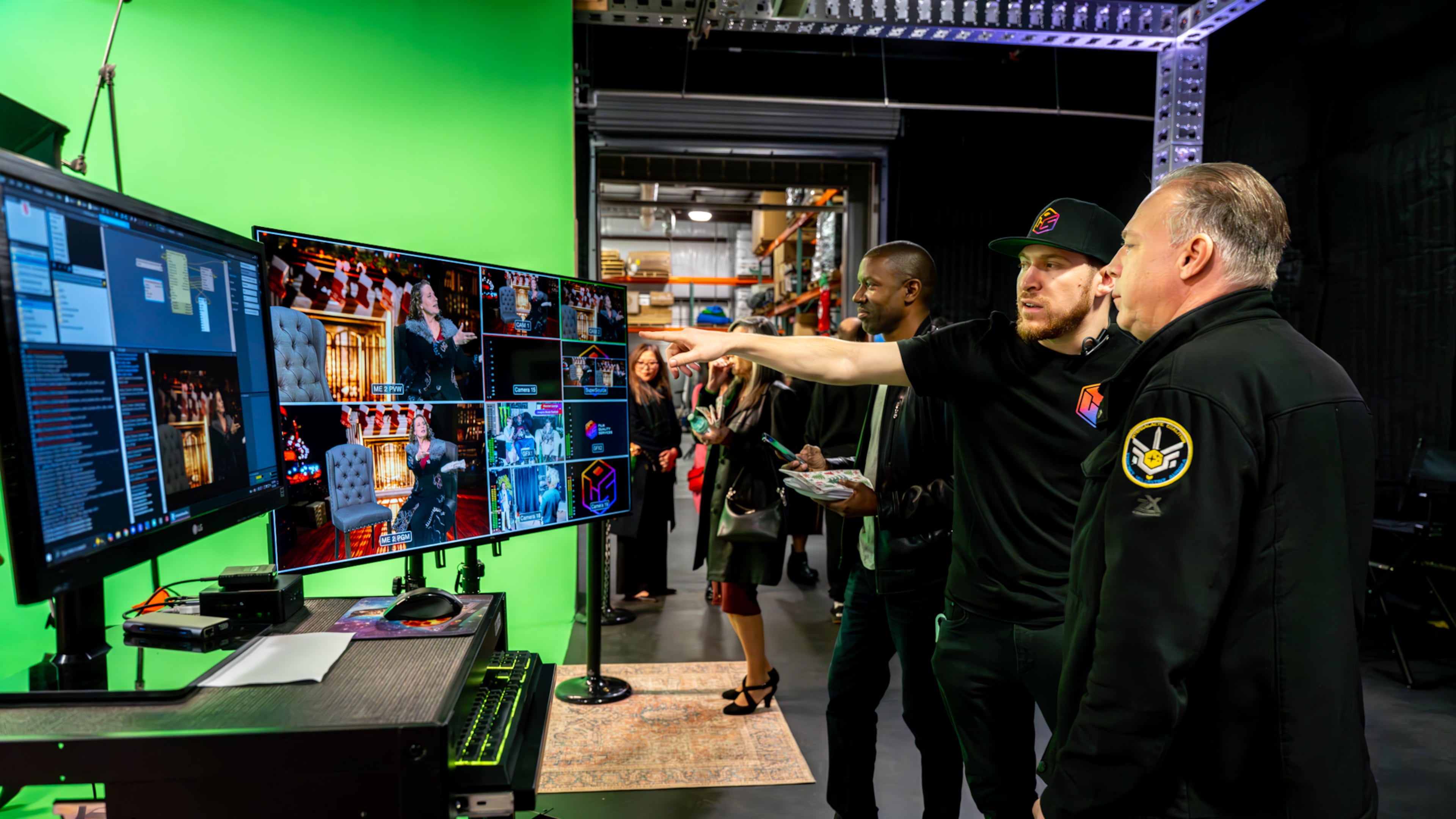After selling family business, Georgia mother and son launched a film studio

For nearly four decades, the Chesneau family sold fuel additives, antimicrobial agents and test kits out of their 12-acre campus in Flowery Branch. Now, they hope the warehouses where they stored products to keep motors running will help fuel their expansion into the entertainment business.
In December, mother-son duo Debra and Cody Chesneau opened Film Quality Studios, having spent a little less than a year converting warehouses on their property into two studios with offices, production space and a control room.
FQS is much smaller than many of the other soundstages dotting the state. The Chesneaus’ two studios are about 4,000 square feet each, compared with, say, the smallest stage at Trilith Studios, which is 15,000 square feet — or about the size of a typical Walgreens. But FQS is trying to fill niches not served by the big guys: Both of its spaces have been built with live broadcasting capabilities, making them ideal for brands, production companies or content creators looking to livestream their content.
This is the type of entertainment Cody Chesneau says audiences are watching as they continue to cut cable and turn their attention toward the massive amounts of free, user-generated content online.
Pop culture is no longer just defined by the widely shared experiences, like people watching the same movies and television shows and discussing them around the water cooler. Content is being created and consumed in smaller, niche communities, Cody said. And this type of content doesn’t always have to be greenlit by producers — it’s free from the red tape of the Hollywood studio system.
Livestreaming is also Cody Chesneau’s wheelhouse. He runs a separate company called Film Quality Services that produces livestreamed content for clients, including Amazon, the Atlanta Braves and Walmart.
“We’re not going to shoot a Marvel movie here,” Cody said. “But there’s still so much we can do.”
Over the past several years, media companies and social media platforms have been locked in a battle for consumer attention as social video watch time has consistently increased. Almost half of Gen Z’s and a third of millennials surveyed by Deloitte said their favorite form of video content is social media videos and livestreams. Younger consumers prefer these types of user-generated videos because they don’t have to spend time searching for what to watch, and can connect with communities of like-minded users, according to the survey.
Twitch, one of the most popular livestreaming services on the globe, found users watched about 20 billion hours of both live and on-demand content on its site in 2024, according to its 2024 annual report. That’s about 2.3 million calendar years.
As for active streamers on the site, Twitch counted more than 21.4 million. Around half that number started streaming that year.
The Chesneaus aren’t exclusively opening their doors to livestreamers however. They want to attract any filmmaker, creator or production company needing a home base of operations in Hall County, northeast of Atlanta.
It’s also not the easiest time to open a studio in the U.S., much less in Georgia. After operating at a near-breakneck speed for two years as streaming services like Netflix tried to boost their content libraries, film and television production has slowed. It ground to a halt during 2023’s Hollywood labor strikes and has yet to rebound to its recent peak.
Fewer productions means less business for Georgia studios, many of which opened right before the strikes. There is plenty of studio space but not enough projects to fill them. But Film Quality Studios doesn’t see itself competing with behemoths like Trilith or Shadowbox Studios.
“With the strikes and everything going on, it’s a concern if I made the right choice,” Debra Chesneau said. “But life is a big risk; you never know about anything. If you don’t try, you’d never know.”
New era for the family business
The idea to transform the property into a studio began to take shape in mid-2023. The family decided to sell the assets to their former company, Fuel Quality Services (sense a theme?), in April of that year when founder and patriarch Howard Chesneau retired. Neither Cody Chesneau nor his sister, Casandra, had a passion for the fuel industry, so they thought it was the right time to sell.
Though the buyer hauled away the company’s remaining equipment and materials, the family retained ownership of their buildings. They considered two options: leasing the warehouses to another company to use for their own purposes, or turn it into a film studio. The latter was Debra Chesneau’s passion, who became involved her daughter’s school theater program.
“I wanted to do something on the creative side,” Debra said. “What could I do going forward that would be something that I enjoy to do, or make a run at, at this point in my life?”
The Chesneaus began their conversion in February. Their buildings already had a lot of the infrastructure necessary to support productions, like backup generators to ensure the studios can stay up and running in bad weather.
But the buildings were designed to be warehouses, so there were weight restrictions on the roof, and the cabling in the building wasn’t equipped to run a business relying on moving large amounts of audio and visual data.
Another challenge they had to address was soundproofing. Cody Chesneau jokes that the warehouses are tin cans made of sheet metal and insulation. So they attached acoustic blankets — which absorb noise and echoes — to the walls, and added 2 inches of spray foam to the roof.
The Chesneaus feel optimistic that production will pick up in the new year.
“But creators don’t need to be greenlit,” Debra Chesneau said. “They can just get in front of the camera and do their thing.”



